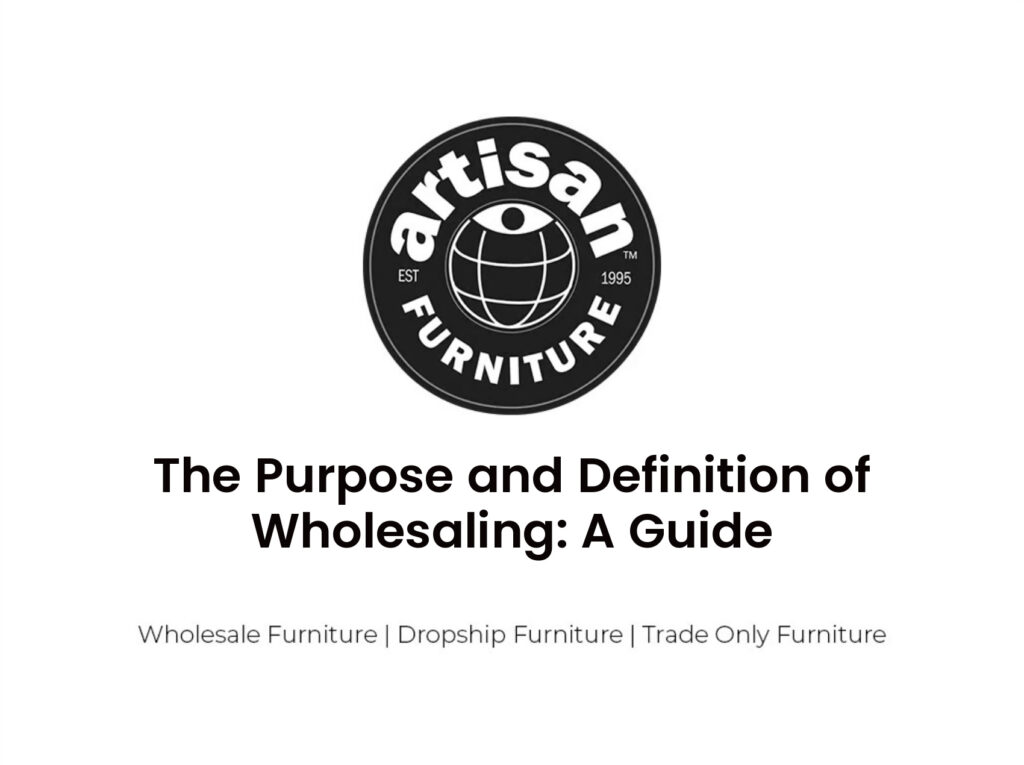The Purpose and Definition of Wholesaling: A Guide
Wholesaling is the sale of goods to retailers, businesses, or other wholesalers, and it plays a vital role in the supply chain. By purchasing goods in bulk at discounted rates and selling them at higher prices, wholesalers generate profit. They act as intermediaries, assembling and redistributing goods in large or small lots. With the rise of e-procurement, wholesalers have shifted their locations closer to manufacturers. In this guide, we explore the purpose and definition of wholesaling, key industry terms, and strategies for successful operations.
Table of Contents
ToggleThe Basics of Wholesaling
Wholesaling involves buying goods in bulk at a discounted rate and selling them to retailers or businesses at a higher price for profit. It is a business model that allows wholesalers to act as intermediaries between manufacturers and end consumers. Wholesalers purchase large quantities of goods directly from manufacturers or sources, taking advantage of volume discounts. They then distribute these goods to retailers, who sell them to the final consumer. The main purpose of wholesaling is to facilitate the movement of goods from producers to retailers, ensuring a smooth supply chain. By buying in bulk and selling at a higher price, wholesalers are able to generate profit. This practice is common in various industries, such as food, clothing, and electronics.
Understanding the Purpose of Wholesaling
Wholesalers play a crucial role in the supply chain by providing goods to retailers and businesses at discounted rates. They act as intermediaries between manufacturers or sources and the end consumer. Here are three ways in which wholesalers contribute to the supply chain:
- Wholesalers buy goods in bulk from manufacturers or sources, allowing them to negotiate lower prices and pass on those savings to retailers and businesses.
- They serve as a central hub where goods are assembled, sorted, graded, and redistributed in large or small lots, ensuring efficient distribution to retailers.
- Wholesale markets, often located near manufacturers in countries like China and Southeast Asia, provide a gathering place for traders to engage in wholesale marketing for foodstuffs.
Through these activities, wholesalers help streamline the distribution process, support retailers with affordable inventory, and ultimately ensure that goods reach consumers efficiently.
Key Definitions in the Wholesaling Industry
Wholesale markets serve as gathering places for traders to engage in wholesale marketing for foodstuffs, providing a central hub for the distribution of goods. These markets bring together wholesalers, retailers, and manufacturers, allowing them to buy and sell goods in large quantities. To paint a clearer picture, here is a table showcasing the different players in the wholesale industry:
| Player | Definition |
|---|---|
| Wholesaler | Buys goods in bulk from manufacturers or sources |
| Retailer | Sells goods to the end consumer at a higher price |
| Manufacturer | Produces goods in large quantities for wholesalers |
Wholesalers act as intermediaries, buying goods at a discounted rate and then selling them to retailers or other wholesalers. This process allows for economies of scale and helps streamline the distribution of goods. Wholesale markets play a vital role in the supply chain, ensuring that goods reach the end consumer efficiently.
The Role of Wholesalers in the Supply Chain
Retailers rely on wholesalers to efficiently distribute goods from manufacturers to the end consumer, ensuring a smooth supply chain process.
-
Wholesalers act as intermediaries, bridging the gap between manufacturers and retailers.
-
They handle the logistics of storing, packaging, and transporting goods.
-
Wholesalers have vast warehouses filled with a wide range of products.
-
Picture rows upon rows of neatly stacked boxes, reaching high into the ceiling.
-
Forklifts buzzing around, swiftly moving pallets of goods from one location to another.
-
Workers diligently sorting and organizing products, ensuring accuracy and efficiency.
-
The bustling atmosphere of the wholesale market, with traders negotiating deals and exchanging goods.
-
Trucks lined up, ready to deliver orders to retailers across the country.
-
The seamless flow of goods, connecting manufacturers, wholesalers, and retailers, ultimately reaching the hands of the end consumer.
Exploring Wholesale Markets and Their Significance
Located in bustling city centers, wholesale markets serve as vibrant hubs where traders convene to engage in the buying and selling of goods in bulk. These markets play a significant role in the distribution and supply chain as they act as intermediaries between manufacturers and retailers. In these markets, wholesalers purchase a large quantity of goods directly from manufacturers at a discounted price. They then sell these goods in smaller quantities to retailers, who eventually sell them to the end consumer. Wholesale markets offer a wide range of products, including food, clothing, electronics, and more. The convenience and variety provided by these markets make them essential for businesses looking to acquire goods at competitive prices and for consumers looking to access a diverse range of products.
Tax Considerations for Wholesalers
After exploring wholesale markets and their significance, it is important for wholesalers to consider tax considerations. Wholesalers in the United States have specific tax regulations that they must adhere to. Here are some key points to keep in mind:
- Sales tax exemptions: Wholesalers may not charge sales tax to buyers who have a resale license in the state. This allows for easier transactions and cost savings for buyers.
- Out-of-state buyers: Wholesalers are also not required to charge sales tax to buyers who are located outside of the state. This can attract customers from different regions and expand the reach of the wholesaler.
- Tax compliance: Wholesalers must ensure that they are fully compliant with all tax regulations and submit the necessary documentation to the appropriate authorities.
Direct Selling Vs. Wholesale Distribution
Direct selling is a more direct and potentially more profitable approach for wholesalers, as they can sell goods directly to the end customer without going through distributors or retailers. By bypassing intermediaries, wholesalers can eliminate additional costs and markups, allowing them to retain a larger portion of the consumer’s price. This approach also gives wholesalers more control over their products and customer relationships. However, direct selling does come with its challenges. Wholesalers may face difficulties in reaching consumers and building brand awareness without the support of established retailers or distributors. Additionally, they may need to invest in marketing and distribution channels to effectively reach their target audience. Despite these challenges, many wholesalers are embracing direct selling as a strategic option to maximize profits and establish a stronger connection with their customers.
Related Concepts in the Wholesaling World
After discussing the differences between direct selling and wholesale distribution, it is important to explore some related concepts in the wholesaling world. These concepts provide a broader understanding of the industry and its dynamics.
-
Wholesale trade: This concept refers to the business-to-business transactions that occur between wholesalers and retailers, businesses, or other wholesalers. It involves buying goods in bulk at discounted rates and selling them at higher prices to the end consumer.
-
Cash and carry: This type of wholesale operation requires customers to pay in cash and carry the goods themselves. It provides a convenient way for buyers to obtain goods quickly and efficiently.
-
Distribution: This process involves getting goods from producers to consumers. Wholesalers play a crucial role in the distribution process by assembling, sorting, grading, and redistributing goods in large or small lots.
These concepts highlight the various aspects and functions of wholesaling, giving insight into its importance within the supply chain.
Strategies for Successful Wholesaling Operations
Wholesalers employ various strategies to ensure the success of their operations, such as building strong relationships with manufacturers, implementing effective inventory management systems, and conducting market research to identify trends and customer demands. By establishing strong relationships with manufacturers, wholesalers can secure reliable sources of quality products and negotiate favorable pricing terms. Effective inventory management systems allow wholesalers to optimize their stock levels, ensuring they have enough products on hand to meet customer demands without excess inventory. Additionally, conducting market research helps wholesalers stay informed about the latest trends and customer preferences, allowing them to adjust their product offerings accordingly. By employing these strategies, wholesalers can position themselves for success in a competitive market and provide value to their customers.



